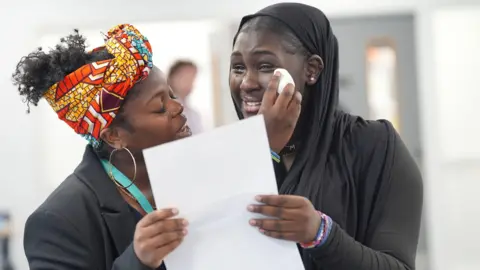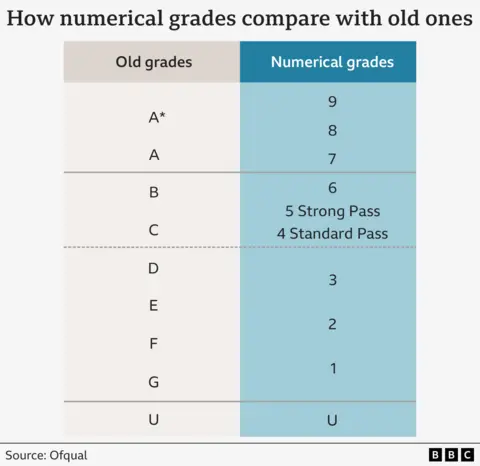 PA Media
PA MediaHundreds of thousands of GCSE students in England, Northern Ireland and Wales have been finding out their grades today.
Here is everything you need to know about results, appeals and resits.
How can I appeal against my GCSE results?
If you do not think your grade is right, you should first talk to your school or college.
It will contact the exam board on your behalf and ask for your marks to be reviewed.
If you still think you have been unfairly graded after a review, you can ask your school or college to appeal.
The exam board will consider whether a correction is needed.
If you are still not satisfied, you can request a review from regulator Ofqual.
How do GCSE resits work if I fail an exam?
You can resit any GCSE exam the following academic year.
In England, students need maths and English GCSEs at grade 4 or above to qualify for further study – although you can prepare for resits alongside your new subjects.
Resits for both subjects take place from 4 November.
If you want to explore resitting a subject, you should speak to your school or college about the best course of action.
What time do GCSE results come out?
GCSE results came out on Thursday, 21 August from 08:00 BST.
Some students in England have been able to get their results via a new app which delivers grades directly to their phones from 11:00 BST on results day.
Around 95,000 pupils in Manchester and the West Midlands will use the app this summer, before it is rolled out more widely.
In Wales and Northern Ireland, results are usually distributed by schools and colleges.
How are GCSEs graded and what are the GCSE grade boundaries?
In England, GCSEs are graded using a numerical system from 9-1, rather than A-E as was previously the case.
Students need 4 for a “standard pass” and 5 for a “strong pass”.
In Wales and Northern Ireland, GCSEs are still graded using letters, unless an exam taken in those nations is managed by an English exam board.

Grade boundaries show the minimum number of marks you need for each grade, whether it is a number of letter.
They are decided by examiners and published on results day.
What are my options after GCSEs?
If you live in England, you must remain in official education or training until you turn 18.
You may choose to stay in full-time education, start an apprenticeship or work while studying part-time.
Many pupils go on to study A-levels. International Baccalaureate (IB) is also an option.
There is also a range of vocational courses you could take, such as National Vocational Qualifications (NVQs), BTec Level 3s, TechBacs, Cambridge Technicals and (in England only) T-levels.
Apprentices get paid a salary, as they spend 80% of their time in the workplace while being trained.
 Getty Images
Getty Images



